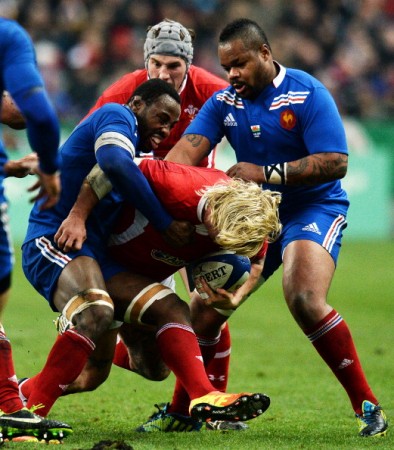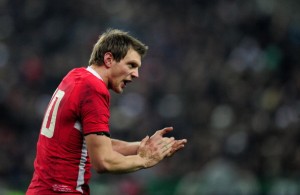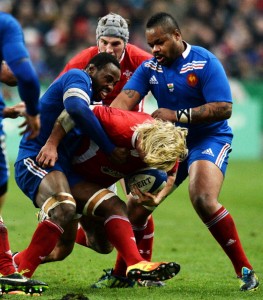
Collective relief: Jamie Roberts and Jonathan Davies show what the Wales win meant after consecutive eight losses
By Paul Williams
The wait is finally over
WALES’ WIN against France cannot be summed up by numbers and statistics – even though, scrum apart, the numbers were in the black. The Welsh lineout ran at an impressive 90.9%. Wales had parity with possession and territory and Leigh Halfpenny once again kicked everything that he placed on the tee. Wales’ defensive stats were heartening – the tackle completion stood at 90.8%. Wales also reduced France to just seven separate visits beyond their 22 yard line and even when the French did manage to enter the redzone Wales didn’t concede a single point as a result. However, all this information is superfluous. As is the fact that France played poorly, very poorly. Wales won. The run of eight straight losses is over. End of. If we are looking for an objective measure for the significance of Wales’ win against France, then measure the carbon dioxide levels in Wales at around 6.40pm on Saturday evening – a nation’s collective sigh of relief was immense.
Dan Biggar deserves praise
Dan Biggar is one of those players who’s judged on his negatives rather than his positives. Hopefully this will not be the case after his performance against France. Biggar played well on Saturday. Granted, there were a few errant kicks, but overall Biggar’s tactical kicking was good – he regularly placed kicks into the opposition’s 22, three or four metres from the touchline, forcing the French covering defenders to kick or carry into touch. He defended his channel admirably, making eight tackles and missing just one – only one tackle less than Toby Faletau. But by far the most impressive aspect of his game was the way he controlled the last quarter. Supporters have been crying out for an outside-half who can close out a game in the last ten minutes – Biggar did just that. And of course there was the delicate chip kick that led to George North’s try. If Dan Carter, not Dan Biggar, had executed the match-winning chip then the plaudits would be flooding in. The name may be different but the reaction should be the same. As they say, en France, bien joué Dan Biggar.
The Welsh scrum struggled – unusually
The Welsh scrum had a rare off day in Paris. Wales won four, but lost three – a completion of just 57.1%. Even more unusual was the player who was deemed responsible for the fragility – Adam Jones was penalised four times against France. But whilst the Welsh scrum struggled and some of the blame will undoubtedly fall on certain players, the playing surface at Stade de France must share some of the responsibility. The turf was dangerously unstable. It looked like the French supporters had released a mole on to the field instead of a cockerel. It was so bad that a decision to play passive scrums wouldn’t have been out of the question. Of course, Wales can have little complaint, the surface in the Millennium Stadium has had its problems but compared to the pitch in Paris it looked like the Prairies of North Dakota.
Ryan Jones bossed it
In the week leading up to the game all of the attention focused on who would play at seven. As it happened the biggest impact was made by the man who wore six – Ryan Jones. Jones was simply superb against France and it was exactly the sort of performance that Wales required. Jones was Wales’ joint-top ball carrier – along with Andrew Coombs who once again put in a valuable showing. But these weren’t the sort of showpony carries that will be pinged around Twitter – it wasn’t that sort of game. Jones’ carries were short and powerful – the sort that suck up defenders and their energy levels, and rarely result in a turnover. Ryan Jones may no longer be the first name in the starting line-up, but he is undoubtedly the first name on the bench. Wales need his leadership and experience more than ever.
Modern Rugby is boring
Taking nothing away from Wales’ victory in France, but modern rugby can be a desperately drab affair. The word ‘modern’ should have positive connotations. ‘Modern’ is a step forward, a progression. Yet in many ways the modern game has taken rugby backwards – particularly when it comes to entertainment. Defensive systems have become so effective that they are now dominating and destroying the game at the same time. Whilst we all admire teams having a 90%+ tackle completion, as Wales did on Saturday, it is not the reason why people pay £80 for a ticket. We all want rugby to progress, but maybe the game could do with taking a little step backwards – literally. Making the defensive line sit back a metre from the base of a ruck or maul, unless on the try line, may be a good start.







